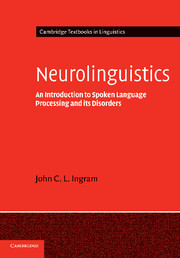Book contents
- Frontmatter
- Contents
- List of figures
- List of tables
- Preface and acknowledgements
- Note on the text
- Part I Foundational concepts and issues
- Part II Speech perception and auditory processing
- 5 The problem of speech recognition
- 6 Speech perception: paradigms and findings
- 7 The speech recognition lexicon
- 8 Disorders of auditory processing
- Part III Lexical semantics
- Part IV Sentence comprehension
- Part V Discourse: language comprehension in context
- Glossary
- References
- Index
8 - Disorders of auditory processing
Published online by Cambridge University Press: 26 January 2010
- Frontmatter
- Contents
- List of figures
- List of tables
- Preface and acknowledgements
- Note on the text
- Part I Foundational concepts and issues
- Part II Speech perception and auditory processing
- 5 The problem of speech recognition
- 6 Speech perception: paradigms and findings
- 7 The speech recognition lexicon
- 8 Disorders of auditory processing
- Part III Lexical semantics
- Part IV Sentence comprehension
- Part V Discourse: language comprehension in context
- Glossary
- References
- Index
Summary
Introduction
It is abundantly clear from the foregoing three chapters that there are many unresolved questions on processes underlying spoken word recognition: the extent to which speech perception relies upon special mechanisms, distinct from the processing of auditory signals in general; the delineation of distinct levels of signal processing in the auditory system and how they interact (e.g. ‘bottom-up’ or feed-forward processing versus ‘top-down’ or feed-back controlled processing); whether mechanisms employed in speech production play an active role in speech perception (the ‘motor’ theory of speech perception); the concrete or abstract nature of stored representations of speech sounds in the recognition lexicon. An important source of evidence on all of these questions, as with the broader question of language processing, comes from the study of auditory processing disorders. Yet as Polster and Rose (1998) point out in their review of the field, a clear taxonomy of disorders of auditory processing has yet to emerge. This they attribute to a range of factors: (a) the comparative rarity of discrete disorders of auditory processing, (b) difficulties of differential diagnosis of auditory processing disorders from aphasia and other forms of auditory agnosia, (c) the inconsistent use of terminology by pioneers in the field, and, perhaps most importantly, (d) our ignorance about the underlying neural mechanisms at higher levels of auditory processing in the brain.
The purpose of the present chapter is to provide a framework for the clinical evaluation of auditory processing disorders underlying the perception of single words.
- Type
- Chapter
- Information
- NeurolinguisticsAn Introduction to Spoken Language Processing and its Disorders, pp. 155 - 176Publisher: Cambridge University PressPrint publication year: 2007

